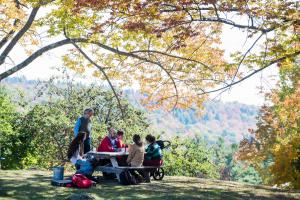Tiny Colleges Matter
By President Kevin Quigley
 Across the U.S., families increasingly question the cost of higher education and voice mounting skepticism that such education will lead their children to a successful future. This questioning occurs against the backdrop of a highly politicized election year, where candidates are trumpeting plans for free—or greatly reduced cost for—public higher education, along with caps on the debt that families can incur. Diminutive Marlboro College is not alone in being buffeted by these challenging winds, perhaps more than much larger and better-endowed institutions, but we do have a unique perspective to bring to the table.
Across the U.S., families increasingly question the cost of higher education and voice mounting skepticism that such education will lead their children to a successful future. This questioning occurs against the backdrop of a highly politicized election year, where candidates are trumpeting plans for free—or greatly reduced cost for—public higher education, along with caps on the debt that families can incur. Diminutive Marlboro College is not alone in being buffeted by these challenging winds, perhaps more than much larger and better-endowed institutions, but we do have a unique perspective to bring to the table.
Recently, I attended a meeting with 14 other college presidents of what we described as “tiny” liberal arts colleges, hosted by the Christian A. Johnson Endeavor Foundation. We ranged from 75 students at Shimer College, in Chicago, to 700 at Bennington College, our closest liberal arts college neighbor. This group included a variety of curricular and pedagogic styles ranging from work colleges like Sterling College in Craftsbury Commons, Vermont; to the College of the Atlantic with its single major, Human Ecology; to St. John’s College with its Great Books curriculum; to Marlboro, where pedagogy is based on our dynamic first dean Roland Boyden’s famous description of the quintessence of education: a bench, a book, a teacher, and a student.
While we had considerable differences among us, each of these 15 tiny colleges believes that the intimacy of a small college setting is essential to fostering collegial, mentoring relationships between students and faculty, which other larger institutions aspire to but rarely achieve. Among this very special group of colleges, Marlboro stands out for our intensive focus on community and, in particular, for the Vermont-style Town Meeting that provides our community a role in the college’s governance.
This year, Marlboro received a planning grant from the Arthur Vining Davis Foundations designed to build on our special traditions by further infusing citizenship and community service into the Marlboro experience. This is just one of the ways we are responding to the growing demand to offer students the skills and experience that will help them define success for themselves, and achieve it while contributing to the communities they become connected to in the future.
As a community, we are working to see recent enrollment challenges as an opportunity for learning and improvement, bringing us closer to the thriving Marlboro we all envision. There will be other challenges besides enrollment, but I am confident that community will continue to remain the vibrant core of all we do, in ways that distinguish Marlboro from even those tiny colleges with which we are most similar.
